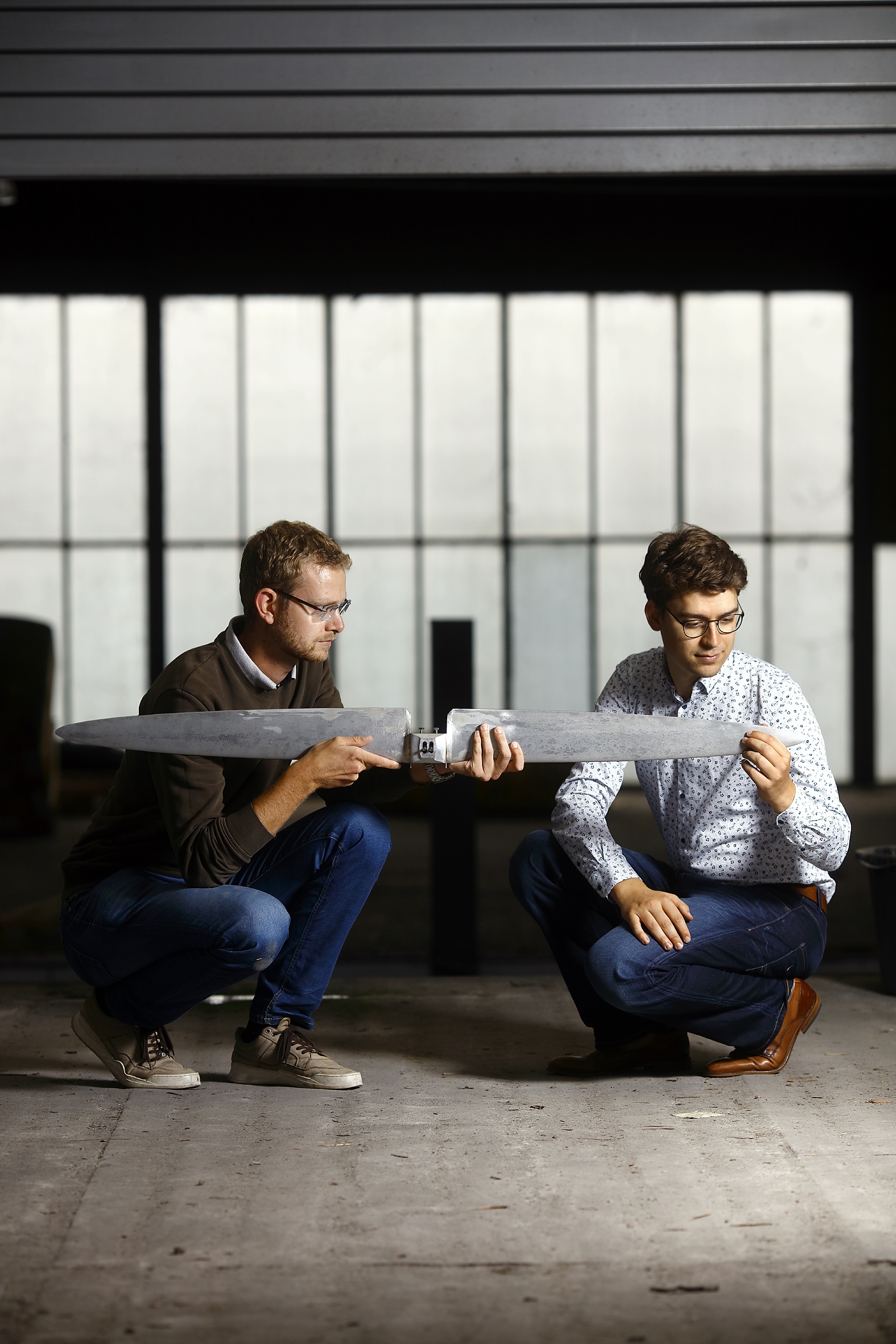With the experience they gained with the Solar Boat Team, three former TU Delft students launched Flying Fish, a maritime innovation company. What is their biggest challenge?
Gijsbert van Marrewijk (r) and Tim Visser first met when they were members of TU Delft’s Solar Boat Team. (Photo: Sam Rentmeester)
Gijsbert van Marrewijk and his Flying Fish co-founders first met when they were members of TU Delft’s Solar Boat Team. They want to make water transport an efficient and sustainable alternative to land transport by applying the Solar Boat’s hydrofoil technology to commercial boats.
Using their simulation software, Host, they can calculate and test which hydrofoil is suitable for which boat. “With a hydrofoil a boat floats above the water and you use up to 60% less fuel,” says Van Marrewijk. “Our Solar Boat, which had the power of two domestic kettles, reached a speed of 50 km/h.”
Van Marrewijk obtained his Master’s in space systems engineering in 2018. His co-founders, brothers Gerben and Johan Schonebaum, studied Aerospace Engineering and High-Tech Engineering. Their fourth partner, Olivier Prakken, comes from outside TU Delft and is an experienced entrepreneur. “Olivier taught us a networking course. We got talking and asked him for advice. He ended up being our fourth founding partner.” Flying Fish was officially launched in December 2018.
Continue reading the story under the text box.
- Company: Flying Fish
- Name: Gijsbert van Marrewijk, co-founder and Tim Visser, employee
- Degree Programme: Aerospace Engineering
- Products: Watertaxi Operations System and HOST Draagvleugel Simulator
- Founded in: 2018
- Employees: Five full-time (including three founders) and six part-time employees
- Turnover: Estimated €150,000 – €200,000 in 2019
- In five years’ time: 6 million passengers using water taxis or hydrofoil boats that use their innovations
Thanks to Prakken’s business experience, the company was able to attract a major partner straight away: the watertaxi in Rotterdam. Van Marrewijk: “We showed them our hydrofoil, but what they wanted was software to help them plan taxi rides more efficiently. As an engineer, you think, too bad, we’ll come back in a few years’ time. But Olivier saw opportunities.”
‘You have to tell companies a good story’
Flying Fish started work on a second product: the Watertaxi Operations System. Using data analytics, they study the shipping lanes and the occupancy levels of the boats. Tim Visser works on that full time: “The watertaxi has a huge set of data. They didn’t know how much of it was useful. Now we are developing a software system to use the boats as efficiently as possible. Travellers will be able to use an app to book a watertaxi.”
Most of the company’s other employees work part time: they are former members of the Solar Boat Team who work for Flying Fish a few days a week alongside their Master’s degree. “As an entrepreneur, you realise that it’s your responsibility to create a good working atmosphere,” says Van Marrewijk. “If our employees enjoy their work, that motivates me, too.”
Creating his own orders is Van Marrewijk’s biggest challenge. “When you approach a company you hope they’ll say: ‘come up with a hydrofoil with these specifications’. It doesn’t work like that. You have to tell them a good story, so that you get the order you want and that is most beneficial to the customer. That’s different from university, where a lecturer knows exactly what to ask of his students.”
Michiel de Haan / Freelance redacteur



Comments are closed.